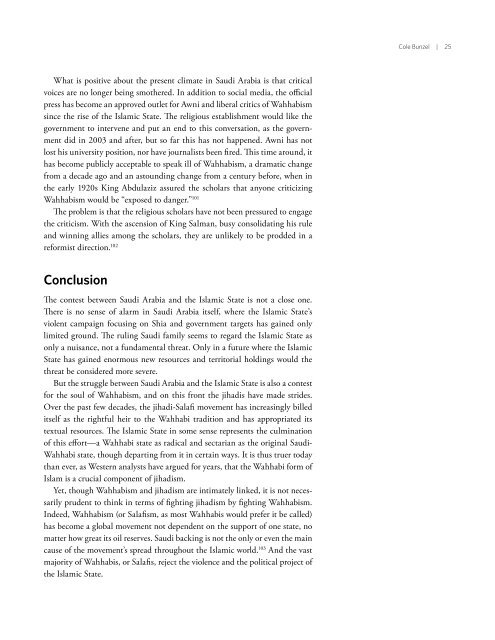Create successful ePaper yourself
Turn your PDF publications into a flip-book with our unique Google optimized e-Paper software.
Cole Bunzel | 25<br />
What is positive about the present climate in Saudi Arabia is that critical<br />
voices are no longer being smothered. In addition to social media, the official<br />
press has become an approved outlet for Awni and liberal critics of Wahhabism<br />
since the rise of the Islamic State. The religious establishment would like the<br />
government to intervene and put an end to this conversation, as the government<br />
did in 2003 and after, but so far this has not happened. Awni has not<br />
lost his university position, nor have journalists been fired. This time around, it<br />
has become publicly acceptable to speak ill of Wahhabism, a dramatic change<br />
from a decade ago and an astounding change from a century before, when in<br />
the early 1920s King Abdulaziz assured the scholars that anyone criticizing<br />
Wahhabism would be “exposed to danger.” 101<br />
The problem is that the religious scholars have not been pressured to engage<br />
the criticism. With the ascension of King Salman, busy consolidating his rule<br />
and winning allies among the scholars, they are unlikely to be prodded in a<br />
reformist direction. 102<br />
Conclusion<br />
The contest between Saudi Arabia and the Islamic State is not a close one.<br />
There is no sense of alarm in Saudi Arabia itself, where the Islamic State’s<br />
violent campaign focusing on Shia and government targets has gained only<br />
limited ground. The ruling Saudi family seems to regard the Islamic State as<br />
only a nuisance, not a fundamental threat. Only in a future where the Islamic<br />
State has gained enormous new resources and territorial holdings would the<br />
threat be considered more severe.<br />
But the struggle between Saudi Arabia and the Islamic State is also a contest<br />
for the soul of Wahhabism, and on this front the jihadis have made strides.<br />
Over the past few decades, the jihadi-Salafi movement has increasingly billed<br />
itself as the rightful heir to the Wahhabi tradition and has appropriated its<br />
textual resources. The Islamic State in some sense represents the culmination<br />
of this effort—a Wahhabi state as radical and sectarian as the original Saudi-<br />
Wahhabi state, though departing from it in certain ways. It is thus truer today<br />
than ever, as Western analysts have argued for years, that the Wahhabi form of<br />
Islam is a crucial component of jihadism.<br />
Yet, though Wahhabism and jihadism are intimately linked, it is not necessarily<br />
prudent to think in terms of fighting jihadism by fighting Wahhabism.<br />
Indeed, Wahhabism (or Salafism, as most Wahhabis would prefer it be called)<br />
has become a global movement not dependent on the support of one state, no<br />
matter how great its oil reserves. Saudi backing is not the only or even the main<br />
cause of the movement’s spread throughout the Islamic world. 103 And the vast<br />
majority of Wahhabis, or Salafis, reject the violence and the political project of<br />
the Islamic State.



